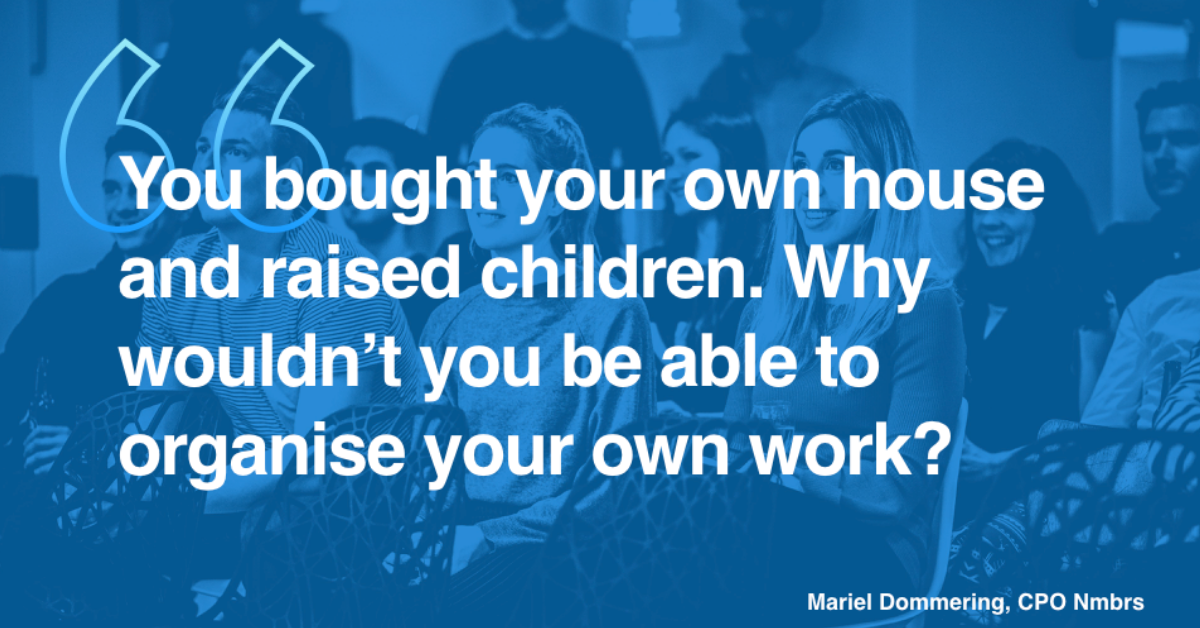At Nmbrs we decided not to hire any managers. We do have a five-person Management Team. The decision to not hire managers makes us more self-steering with every person we hire. Some companies take it even one step further and adopt the full Holacracy principle like Ruben Timmerman did with his company Springest.
"I believe that managerial power corrupts and has a tendency to absorb talent and money."
When I was 23, I started my first official job in hospitality, as an assistant banqueting manager at an airport hotel. One of my responsibilities was copying the daily - a document showing all events and groups for that day with their needs. Usually the daily is printed in landscape, but I had copied it in portrait. All information fitted, but it was not in landscape layout. I argued more than an hour with my manager who felt that I had to re-do the task because these papers were always landscape. After that hour I decided that I would keep the document like this and the next day nothing went wrong!
What I remember most is the walk home. I do not know if you know Airport hotels, but most of the times, they are in the middle of nowhere. I had to walk twenty minutes to the bus station, it was cold, the wind blew very hard, and it was pitch dark. With every step I took, I thought: leave me alone; please leave me alone, let me do my own thing.
At that moment, the seed was planted for a life without managers.
But how do you start? And how will the rest of the company accept this new approach? Together with Ruben Timmerman, founder of Springest, and Tom Haak, HR Trendwatcher, we formulated six key points to keep in mind when starting a manager-free environment.
1). Create your own
Holacracy, agile, no-manager, many companies already started flatten the organisation for example companies like Zappos, Netflix and Semco. All great names and perfect cases without managers. Many companies use these examples and try to copy their structure, but every company has its own culture and its processes. Of course, you can use examples, and you should not reinvent the wheel. But always keep your own culture in the back of your mind. Working without managers is not something you can implement in a day, it is a continues loop of testing and trying, until you find the best solution for your company.
2). If it’s not written down, it doesn’t exist.
A company will only succeed without managers when they start writing everything down. Because who will make sure everybody adheres the rules? We work with the Nmbrs book, where we try to have all processes stated, so everybody knows which path to follow. It is also one of the base rules at Springest. Ruben Timmerman: "We write things down, almost always in Asana with some exceptions at circle level (e.g. developers make comments on the code in Github because that suits the work better). If we talk about some work that has to be done, the conversation will end with “I’ll make a task for you in Asana”. Our self-managed organisation is arguably more documented, more structured and more explicit than the average corporate in a heavily regulated industry.”
3). Use coaches or a support system, to help your employees perform
Having a completely flat organisation brings some extra pressure to employees. All the work they do is visible to everybody, and they are accountable for it. Working with no manager means, that nobody is holding an umbrella to protect you from pressure from above. A manager-free company will only succeed when there are dedicated coaches to support employees in optimal performing.

4). Have continuous feedback cycles
Addressing each other is a crucial element when you are implementing a no-manager structure. Many companies still rely on the extremely hierarchical, traditional sit-down annual reviews rather than building a feedback loop into the daily operations. Employees should be encouraged to give or request feedback from colleagues at any time, providing them with real-time 360-degree insight into their performance.
5). Use a performance management system
But when we don't have any managers, who determine individual salary raises and updates employees about their day to day performances? Having a performance management system in place is a no-brainer for every manager-free company. It assists employees to rate their peers and vice-versa. It shows clear overviews on their feedback and performance, and it helps you to keep track of personal and company goals.
6). Focus on results instead of the process
Your employees are the ones close to the action, and they are aware of what is going on at the front lines. Managers in the beautiful corner offices are most likely unaware of this. Consider, for example, a cleaning schedule. It might dictate sweeping floors twice a week and cleaning toilets every Monday, Wednesday and Friday. But if the bathroom is dirty on Tuesday, it would be stupid to wait until Wednesday to clean it.”
It might sound like I am stating the obvious. But you’d be surprised to find out how much of this kind of nonsense occurs in today’s organisations.
Make sure your employees focus on results. If they run into a problem, they should take the necessary action. For example, if a machine breaks down, they have to figure out a way to get it fixed. If they don’t, they can’t continue and therefore won’t achieve the result. In many traditional organisations, employees report a problem and wait until it is resolved. They take no ownership of the problem, and often they are not allowed to, because that’s somebody else’s job.
But let’s be honest. Building an organisation without managers is hard, very hard. The reason why it is so hard is that we were all raised in a world where the power was distributed unevenly. Your parents were in charge, your teachers were in charge, and your managers were in charge. This is how society is built. That is why it is so hard to change. But by imagining this world without managers, we will be able to create this new reality. Together!









